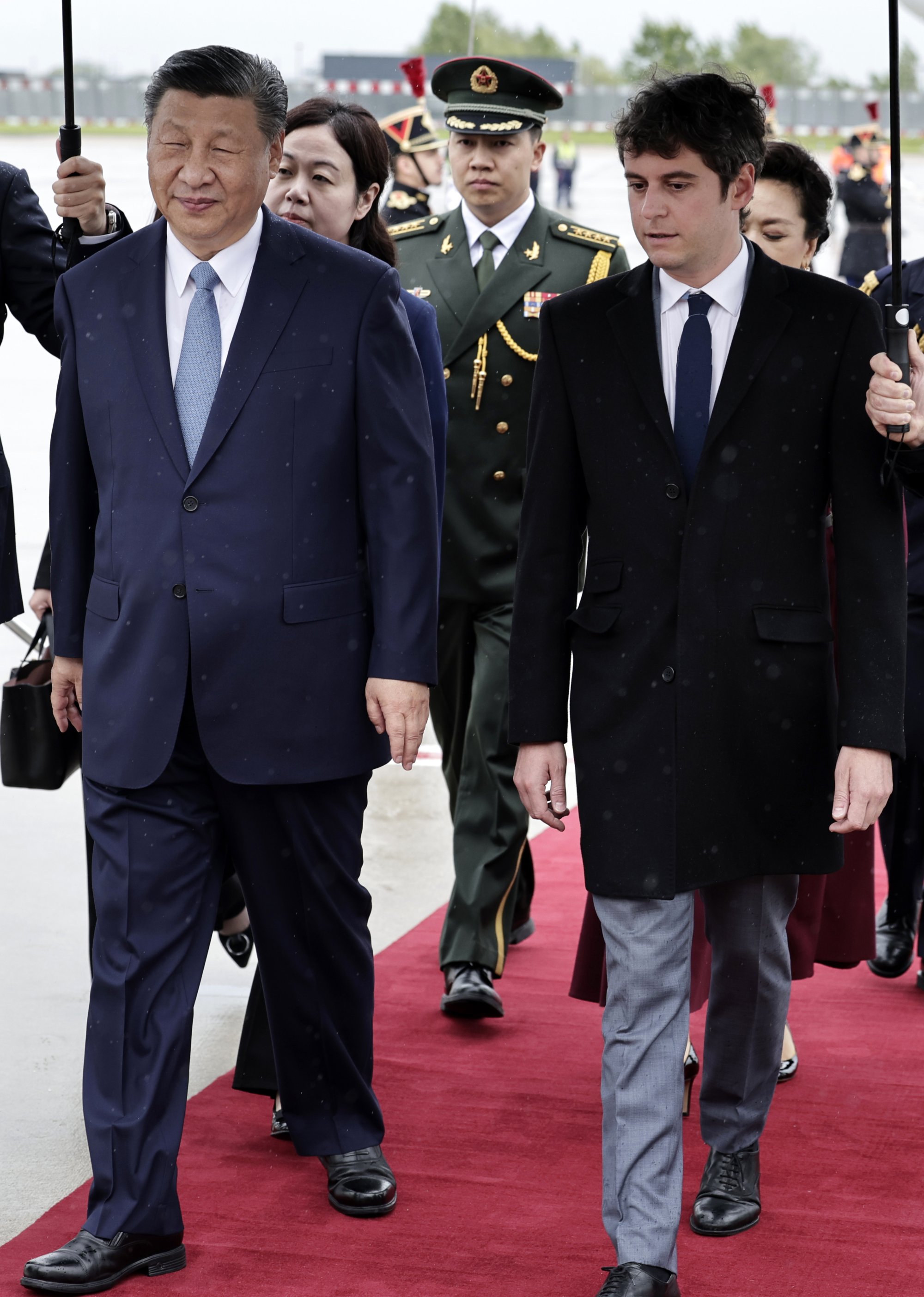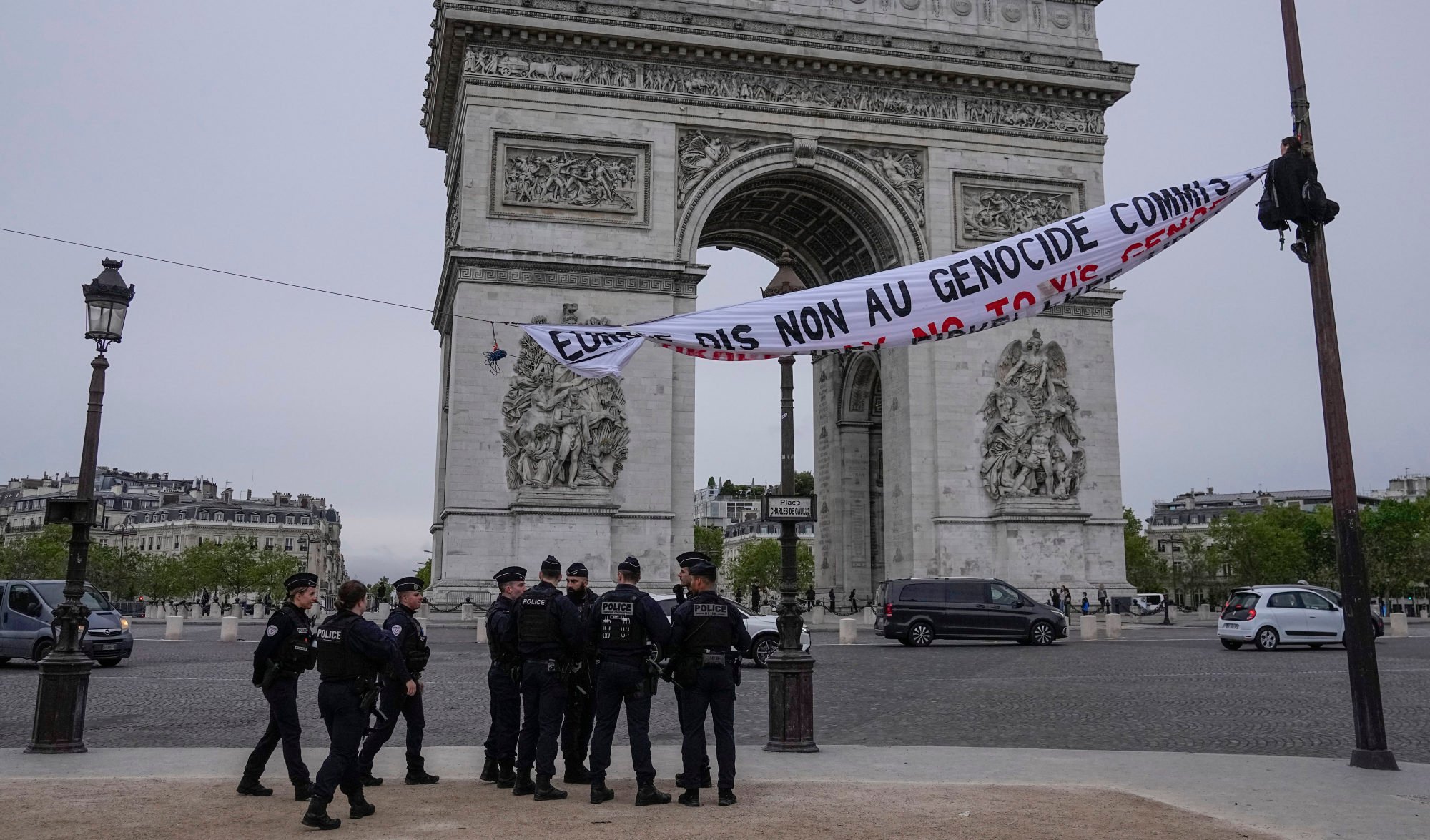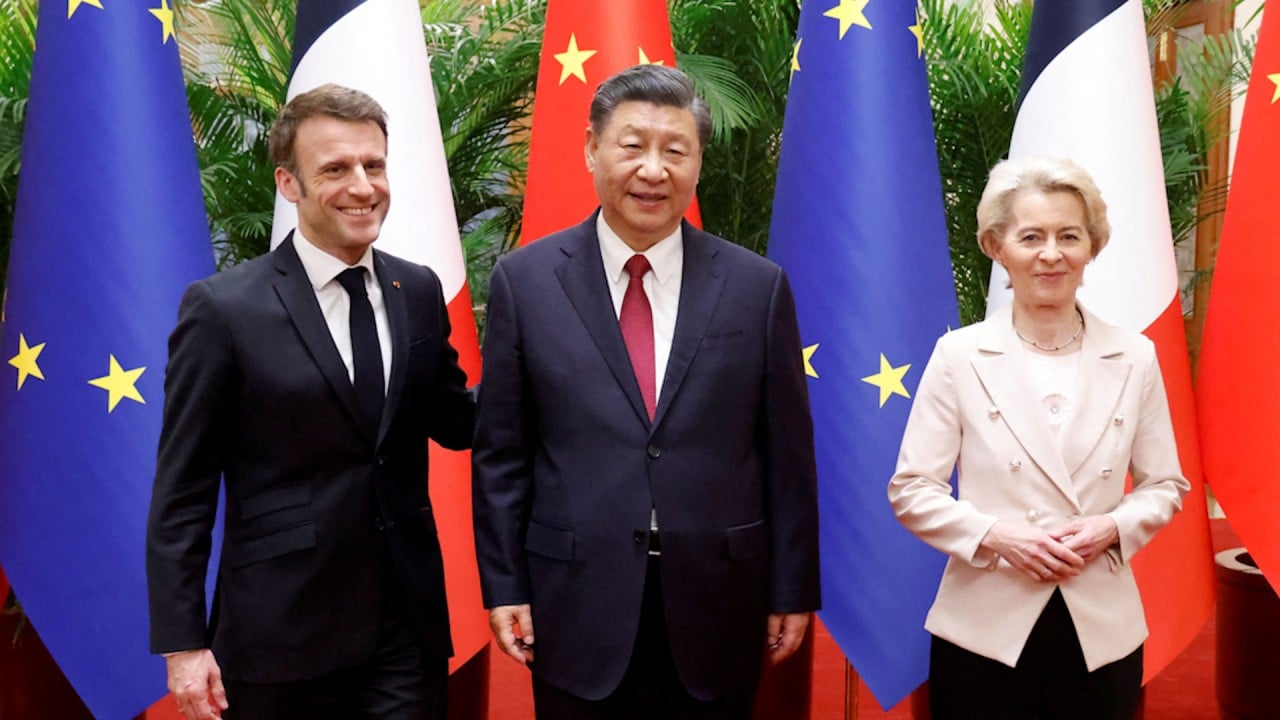
Chinese President Xi Jinping arrives in Paris with EU trade, Ukraine among hot button issues on table
- Accompanying Xi on his first European tour in five years is his wife Peng Liyuan, chief of staff Cai Qi and Foreign Minister Wang Yi
- Thorniest China-EU issues to be on table when Xi meets French counterpart Emmanuel Macron and commission chief Ursula von der Leyen on Monday
Accompanying Xi on his first European tour in five years is his wife Peng Liyuan, chief of staff Cai Qi, and Foreign Minister Wang Yi, according to a statement from Beijing. The five-day trip will also take Xi to Serbia and Hungary.
The delegation is expected to spend two days in France, with Xi to meet President Emmanuel Macron and the European Commission chief Ursula von der Leyen in Paris on Monday, ahead of a state dinner.
EU cranks up the pressure as China’s Xi Jinping prepares for 3-nation visit
The European Union has stepped up its “de-risking” approach to address economic overdependence on China, and what it calls Beijing’s increasing geopolitical “assertiveness” as relations with the West worsen.
The drive includes investigations targeting China’s clean energy industry – where it has emerged as a global leader – involving products including electric vehicles, solar panels and wind turbines, with Beijing accused of “flooding” the European market with heavily subsidised cheaper products.
Macron, who is known for his pro-European approach, is a major supporter of the bloc’s tougher economic measures against China. He is also believed to be a proponent of the EU’s anti-subsidy investigation into Chinese EVs, which has prompted Beijing to retaliate with a similar investigation into French brandy.

In an interview with the French newspaper La Tribune published on Saturday, Macron said he would press Xi on economic reciprocity.
“In Europe, we are not unanimous on the subject because certain players still see China as essentially a market of opportunities. I’m calling for an ‘aggiornamento’ because China is now in excess capacity in many areas and exports massively to Europe,” Macron said, using the Italian word for update.
Macron added that China’s role was crucial on international issues where Europe needed its engagement, whether it was climate change, or security issues concerning Ukraine, North Korea or Iran. Conflicts in the Middle East are also expected to be discussed in the meeting with Xi.
“I am not suggesting we move away from China,” Macron told La Tribune. “However, I think that we must better protect our national security, our sovereignty, de-risk a part of our supply chains and be much more realistic in defending our interests.”
In an article for Le Figaro newspaper, Xi said he wanted to work with the international community to find ways to solve the conflict ignited by Russia’s invasion of Ukraine, while emphasising that China was “neither a party nor a participant” in the conflict.
“We hope that peace and stability will return quickly to Europe, and intend to work with France and the entire international community to find good paths to resolve the crisis,” he wrote.
Xi vowed to improve cooperation with France in areas such as innovation and green development and said China was open to “more quality French agricultural products and cosmetics”.
He also said China welcomed investment by French companies and hoped that as more Chinese companies invested in France, France would “ensure that they [Chinese companies] operate in a fair and equitable business environment”.
Arriving at Paris-Orly Airport on Sunday, Xi said that over the past six decades, ties between China and France had been an example for other “countries with different social systems to exist in peace and pursue win-win cooperation”.
He said he would engage in in-depth discussions with Macron about the evolving dynamics of China’s relations with France and Europe, as well as significant global and regional matters.
“I hope this visit will help cement our long-standing friendship, enhance political trust, build strategic consensus and deepen exchanges and cooperation in various fields,” Xi said.
During his visit to China last year, Macron was accompanied by a large business delegation and brought home a number of significant deals in nuclear energy, aviation, and agriculture, even though he was unsuccessful in persuading Xi to jointly act on Russia.
Xi’s visit will see France seek to further boost agricultural exports to China, and also repeat the plea for Beijing to use its influence on Moscow, including on negotiating a potential truce during the Paris Olympic Games starting late July, according to Macron and his officials.
China has yet to condemn Russia’s invasion of Ukraine and is criticised by the West for siding with Moscow because of their close ties. Russian President Vladimir Putin is reportedly expected to visit China soon after Xi returns from Europe.
China insists it has a neutral stance in the war and is using its own methods to bring peace to Ukraine, including efforts for direct talks between the two sides at next month’s global peace summit in Switzerland.
Rights groups are urging Macron to bring up human rights, accusing China of failing to respect the rights of the Uygur Muslim minority and of keeping dozens of journalists behind bars.
“President Macron should make it clear to Xi Jinping that Beijing’s crimes against humanity come with consequences for China’s relations with France,” said Maya Wang, acting China director at Human Rights Watch.
The group said human rights in China had “severely deteriorated” under Xi’s rule.

Also on Sunday, hundreds of protesters unfurled a Tibetan flag at a demonstration in Paris, accusing Xi of being a “dictator” and wanting to erase local culture in the Tibet region, an Agence France-Presse reporter said.
On Tuesday, Macron is expected to bring Xi to the Pyrenees mountains on the Spanish border, a place the French president holds dear as his grandmother’s birthplace and where he spent his childhood holidays.
According to French media, the personal gesture aims to echo Xi’s decision to host a tea ceremony for Macron at the former residence of his father in southern China.
In an opinion piece published on state-run CGTN on Sunday, Chinese envoy to France Lu Shaye said relations with France were “at the forefront of China’s relations with Western countries”. It is hoped France’s “independent” policy towards China would open up more cooperation while resolving mutual “differences” as the two countries mark 60 years of diplomatic ties, Lu wrote.
China has long called on the EU to remain strategically independent of US policy, as more members of the 27-nation bloc follow Washington in imposing economic and technological restrictions on China.
Many see Xi’s trip as an attempt by China to regain the trust of Europe, while driving a wedge between the US and its allies as cracks begin to show over US security commitment to Ukraine.
Xi’s next stops – the Russia-friendly Serbia and Hungary – both have strained relations with the United States.
Xi’s trip to Serbia coincides with the 25th anniversary of the Nato bombing of the Chinese embassy in Belgrade.
He also aims to strengthen partnerships with both central European countries under the Belt and Road Initiative, the funding and infrastructure strategy criticised by the West as China’s flagship project to reshape the global order.
Additional reporting by Agence France-Presse

 - Kawala Xie.jpg?itok=NogZcyZ-&v=1661304068)
